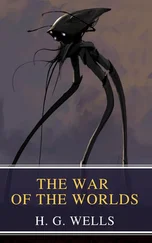The storm burst upon us six years ago now. As Mars approached opposition, Lavelle of Java set the wires of the astronomical exchange palpitating with the amazing intelligence of a huge outbreak of incandescent gas upon the planet. It had occurred towards midnight of the twelfth; and the spectroscope, to which he had at once resorted, indicated a mass of flaming gas, chiefly hydrogen, moving with an enormous velocity towards this earth. This jet of fire had become invisible about a quarter past twelve. He compared it to a colossal puff of flame suddenly and violently squirted out of the planet, ‘as flaming gases rushed out of a gun.’
A singularly appropriate phrase it proved. Yet the next day there was nothing of this in the papers except a little note in the DAILY TELEGRAPH, and the world went in ignorance of one of the gravest dangers that ever threatened the human race. I might not have heard of the eruption at all had I not met Ogilvy, the well-known astronomer, at Ottershaw. He was immensely excited at the news, and in the excess of his feelings invited me up to take a turn with him that night in a scrutiny of the red planet.
In spite of all that has happened since, I still remember that vigil very distinctly: the black and silent observatory, the shadowed lantern throwing a feeble glow upon the floor in the corner, the steady ticking of the clockwork of the telescope, the little slit in the roof — an oblong profundity with the stardust streaked across it. Ogilvy moved about, invisible but audible. Looking through the telescope, one saw a circle of deep blue and the little round planet swimming in the field. It seemed such a little thing, so bright and small and still, faintly marked with transverse stripes, and slightly flattened from the perfect round. But so little it was, so silvery warm — a pin’s-head of light! It was as if it quivered, but really this was the telescope vibrating with the activity of the clockwork that kept the planet in view.
As I watched, the planet seemed to grow larger and smaller and to advance and recede, but that was simply that my eye was tired. Forty millions of miles it was from us — more than forty millions of miles of void. Few people realise the immensity of vacancy in which the dust of the material universe swims.
Near it in the field, I remember, were three faint points of light, three telescopic stars infinitely remote, and all around it was the unfathomable darkness of empty space. You know how that blackness looks on a frosty starlight night. In a telescope it seems far profounder. And invisible to me because it was so remote and small, flying swiftly and steadily towards me across that incredible distance, drawing nearer every minute by so many thousands of miles, came the Thing they were sending us, the Thing that was to bring so much struggle and calamity and death to the earth. I never dreamed of it then as I watched; no one on earth dreamed of that unerring missile.
That night, too, there was another jetting out of gas from the distant planet. I saw it. A reddish flash at the edge, the slightest projection of the outline just as the chronometer struck midnight; and at that I told Ogilvy and he took my place. The night was warm and I was thirsty, and I went stretching my legs clumsily and feeling my way in the darkness, to the little table where the siphon stood, while Ogilvy exclaimed at the streamer of gas that came out towards us.
That night another invisible missile started on its way to the earth from Mars, just a second or so under twenty-four hours after the first one. I remember how I sat on the table there in the blackness, with patches of green and crimson swimming before my eyes. I wished I had a light to smoke by, little suspecting the meaning of the minute gleam I had seen and all that it would presently bring me. Ogilvy watched till one, and then gave it up; and we lit the lantern and walked over to his house. Down below in the darkness were Ottershaw and Chertsey and all their hundreds of people, sleeping in peace.
He was full of speculation that night about the condition of Mars, and scoffed at the vulgar idea of its having inhabitants who were signalling us. His idea was that meteorites might be falling in a heavy shower upon the planet, or that a huge volcanic explosion was in progress. He pointed out to me how unlikely it was that organic evolution had taken the same direction in the two adjacent planets.
‘The chances against anything manlike on Mars are a million to one,’ he said.
Hundreds of observers saw the flame that night and the night after about midnight, and again the night after; and so for ten nights, a flame each night. Why the shots ceased after the tenth no one on earth has attempted to explain. It may be the gases of the firing caused the Martians inconvenience. Dense clouds of smoke or dust, visible through a powerful telescope on earth as little grey, fluctuating patches, spread through the clearness of the planet’s atmosphere and obscured its more familiar features.
Even the daily papers woke up to the disturbances at last, and popular notes appeared here, there, and everywhere concerning the volcanoes upon Mars. The seriocomic periodical PUNCH, I remember, made a happy use of it in the political cartoon. And, all unsuspected, those missiles the Martians had fired at us drew earthward, rushing now at a pace of many miles a second through the empty gulf of space, hour by hour and day by day, nearer and nearer. It seems to me now almost incredibly wonderful that, with that swift fate hanging over us, men could go about their petty concerns as they did. I remember how jubilant Markham was at securing a new photograph of the planet for the illustrated paper he edited in those days. People in these latter times scarcely realise the abundance and enterprise of our nineteenth-century papers. For my own part, I was much occupied in learning to ride the bicycle, and busy upon a series of papers discussing the probable developments of moral ideas as civilisation progressed.
One night (the first missile then could scarcely have been 10,000,000 miles away) I went for a walk with my wife. It was starlight and I explained the Signs of the Zodiac to her, and pointed out Mars, a bright dot of light creeping zenithward, towards which so many telescopes were pointed. It was a warm night. Coming home, a party of excursionists from Chertsey or Isleworth passed us singing and playing music. There were lights in the upper windows of the houses as the people went to bed. From the railway station in the distance came the sound of shunting trains, ringing and rumbling, softened almost into melody by the distance. My wife pointed out to me the brightness of the red, green, and yellow signal lights hanging in a framework against the sky. It seemed so safe and tranquil.
Chapter II
The Falling Star
Then came the night of the first falling star. It was seen early in the morning, rushing over Winchester eastward, a line of flame high in the atmosphere. Hundreds must have seen it, and taken it for an ordinary falling star. Albin described it as leaving a greenish streak behind it that glowed for some seconds. Denning, our greatest authority on meteorites, stated that the height of its first appearance was about ninety or one hundred miles. It seemed to him that it fell to earth about one hundred miles east of him.
I was at home at that hour and writing in my study; and although my French windows [6] French windows — широкое панорамное окно до пола.
face towards Ottershaw and the blind was up (for I loved in those days to look up at the night sky), I saw nothing of it. Yet this strangest of all things that ever came to earth from outer space must have fallen while I was sitting there, visible to me had I only looked up as it passed. Some of those who saw its flight say it travelled with a hissing sound. I myself heard nothing of that. Many people in Berkshire, Surrey, and Middlesex must have seen the fall of it, and, at most, have thought that another meteorite had descended. No one seems to have troubled to look for the fallen mass that night.
Читать дальше
Конец ознакомительного отрывка
Купить книгу
![Герберт Уэллс The War of the Worlds [С англо-русским словарем] обложка книги](/books/26611/gerbert-uells-the-war-of-the-worlds-s-anglo-cover.webp)
![Чарльз Диккенс - A Tale of Two Cities [С англо-русским словарем]](/books/26616/charlz-dikkens-a-tale-of-two-cities-s-anglo-thumb.webp)










